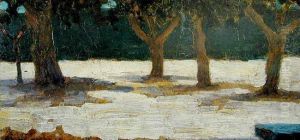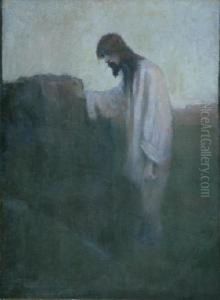Eligiusz Niewiadomski Paintings
Eligiusz Niewiadomski was a Polish artist, art critic, and nationalist, who became infamous for his assassination of Gabriel Narutowicz, the first President of Poland, in 1922. Born on December 1, 1869, in Warsaw, which was then part of the Russian Empire, Niewiadomski was deeply embedded in the world of Polish art and politics from a young age. He studied at the Kraków Academy of Fine Arts and later in Munich, which was a significant center for art students from the Polish territories under partition. His artistic career was marked by his contributions to the Young Poland movement, an avant-garde and nationalist movement that sought to express the modern Polish spirit through art and literature.
Throughout his career, Niewiadomski worked as an art critic and an administrator, taking roles that included being a curator at the Warsaw Society of Fine Arts and teaching at the Warsaw School of Fine Arts. His work and views were deeply influenced by his nationalist beliefs, which were common among intellectuals in the partitioned Poland. These beliefs eventually led him down a path of radical political action.
After Poland regained independence in 1918, following the end of World War I, the nation's political landscape was tumultuous. The election of Gabriel Narutowicz as the first president of the Second Polish Republic in December 1922 sparked controversy, especially among nationalists who viewed Narutowicz's support base— which included leftists, Jews, and other minorities—as antithetical to their vision of Poland. Niewiadomski, who had grown increasingly radicalized, saw Narutowicz's presidency as a betrayal of Polish nationalism. On December 16, 1922, just five days after Narutowicz took office, Niewiadomski assassinated the president at the Zachęta National Gallery of Art in Warsaw.
Niewiadomski's act shocked the nation and the world. He was quickly arrested, tried, and sentenced to death. Throughout his trial, he remained unrepentant, viewing his act as a sacrifice for the Polish nation. He was executed by firing squad on January 31, 1923. Niewiadomski's assassination of Narutowicz is remembered as a tragic moment in Polish history, highlighting the deep divisions within the country during its early years of independence. Despite his contributions to Polish art and culture, Niewiadomski's legacy is forever overshadowed by his political extremism and the murder of President Narutowicz.

